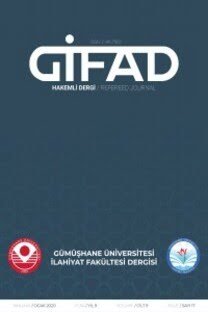The Impact of Orientalists on Ghāmidī’s Theories
Ghāmidī Orientalists, Variant readings, Sources, Religion, Hadith
The Impact of Orientalists on Ghāmidī’s Theories
Ghāmidī Orientalists, Variant readings, Sources, , Religion, , Hadith,
___
- Abdur Rehman al-badavī, Mawsūatu’l Mustashriqīn, Dar al-Ilam, Beirut. 1993.
- al- Bukhārī, Abū Abdillāh Muhammad Ibn Ismāil [d. 256 A.H], Mukhtasr Sahīh al- Bukhārī, Maktaba al- Maārif, Riyadh – KSA. 2002.
- al-Hākim, Abū Abdillāh Muhammad Ibn Abd-Allah al-Nīshāpurī (d. 405 A.H), Marifat ulūm al-Hadith, ed: Muazzam Hussain, Dar al-Kutub al-Ilmia, Beirut, 1977.
- al-Khatib al-Baghdādī, Abū Bakr Ahmad Ibn `Ali Ibn Thabit Ibn Ahmad Ibn Mahdi al-Shafi'i (d. 463 A.H), al-Kifāya fi ilmi'r-Rivāya, ed: Abū Abdillah al-Suraqi, al- Maktabtu’l Ilmia, Medina-KSA.
- al-Rāmhurmuzī, Abū Muḥammad al-Ḥasan Ibn ʻAbd al-Raḥmān Ibn Khallād (d. 360 A.H), al-Muhadith al-Fāsil, ed: Dr. Muhammad Ajaj al-Khatib, Dar al-Fikar, Beirut, 1404 AH.
- az- Zahabī, Abū Abdillāh Muhammad Ibn Ahmad [d. 748 A.H], Tazkiratu’l-Hufāz, Dar al-kutub al-Ilmia, Beirut. 1998.
- Ghāmidī, Javed Ahmad, Mīzān, al-Mawrid, Topical printing Press, Lahore. 2014.
- Ignāz Goldziher [d. 1921], al- Aqīda ve-Sharia fi al-Islām, Arabic translation: Muhammad Yūsūf Mūsā, Ali Hussain Abdul Qādir, Abdul Aziz Abdul Haq. al- Gabalaya St. Opera House. Cairo. 2013.
- ________________, Mazāhib at-Tafsir al-Islāmī, Arabic: Abdul Halim an- Najār. Maktaba al-Khānjī. Egypt. 1955.
- ________________, Muslim Studies, Translated from German. C. R. Barbar and S. M.Stern. George Allen and Unwin LTD. Ruskin House Museum Street. London.
- Juynboll, G. H. A [d. 2010], Muslim Tradition, Cambridge University Press, Melbourne-Sydney. 1983.
- Khan, Alam, Takyīmu Nazariyyāti Juynboll Havla al-hadis’n Nabavī, Kalem Yayinevi, Trabzon-Turkey, 2019.
- Mamar Ibn Rāshid [d. 153 A.H], al- Jāmi, ed: Habib ur Rehman al- Azāmī, al- Majlis al- Ilmi, Pakistan. 1403 A.H.
- Mesut, OKUMUŞ. [2002]. “Arthur Jeffery ve Kur' an Çalışmaları Üzerine”. Ankara Üniversitesi İlahiyat Fakültesi Dergisi. Cilt XLIII, Say 2 s.121-150.
- Noldeke, Theodor [d. 1930], The History of the Qurān, ed: Friedrich Schwally, Gotthelf Bergsträßer, Otto Pretzl. Translated: Wolfgang H. Behn. Brill, Leadon- Boston. 2003
- Yayın Aralığı: 2
- Başlangıç: 2012
- Yayıncı: Gümüşhane Üniversitesi İlahiyat Fakültesi
الفِعْل ضَرَبَ ودلالاتُه في الّلغة العَربيّة قديمًا وحديثًا / دِراسةٌ دَلاليّة
Abdulkareem Mohammad Hafidh ALABEYDİ
ŞEYH HACI MUHAMMED YÂSÎN EFENDİ’NİN HAYATI, ESERİ VE TASAVVUF ÂDÂBI
Hadis Araştırmalarında Usûl Kitabının Tetkîki
Šah Ismail Als Historische Person
Mu‘tezilî Müfessir Ebu’l-Kāsım El-Belhî’nin Kıraatlere Yaklaşımı
Kimlik, Mekan, Kutsallık: Tüketim Mabetlerinde Kimlik Arayışı
The Impact of Orientalists on Ghāmidī’s Theories
Toplumsal Şiddet Bağlamında Fiten Hadislerine İlişkin Bir Değerlendirme
TOPLUMSAL ŞİDDET BAĞLAMINDA FİTEN HADİSLERİNE İLİŞKİN BİR DEĞERLENDİRME
FİİLİ VE ARAP DİLİNDEKİ ESKİ VE YENİ ANLAMLARI: SEMANTİK BİR ARAŞTIRMA
